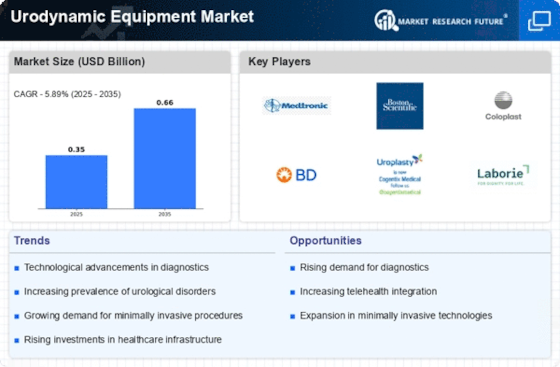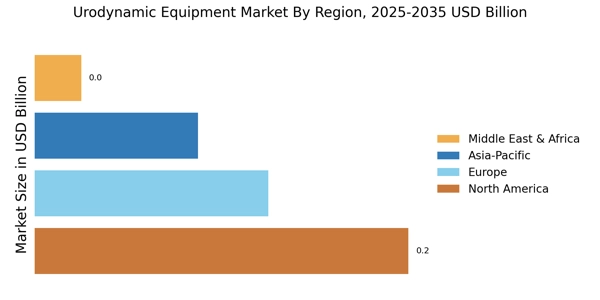Growing Geriatric Population
The Urodynamic Equipment Market is significantly impacted by the growing geriatric population, which is more prone to urological disorders. As individuals age, the likelihood of developing conditions such as urinary incontinence and bladder dysfunction increases, necessitating effective diagnostic tools. This demographic shift is prompting healthcare providers to invest in urodynamic equipment to address the specific needs of older patients. The increasing life expectancy in many regions further exacerbates this trend, as a larger segment of the population requires specialized care for urological issues. Consequently, the demand for urodynamic testing is expected to rise, driving market growth. Additionally, the focus on improving the quality of life for elderly patients is likely to encourage the adoption of advanced urodynamic technologies.
Focus on Patient-Centric Care
The Urodynamic Equipment Market is witnessing a shift towards patient-centric care, which emphasizes the importance of personalized treatment plans and improved patient experiences. This trend is driving the demand for urodynamic equipment that not only provides accurate diagnostic information but also enhances patient comfort during testing procedures. Healthcare providers are increasingly recognizing the value of investing in equipment that minimizes discomfort and anxiety for patients. As a result, manufacturers are developing user-friendly devices that incorporate ergonomic designs and intuitive interfaces. This focus on patient-centricity is likely to foster greater patient compliance with diagnostic procedures, ultimately leading to improved health outcomes. The integration of telemedicine and remote monitoring solutions in urodynamic testing further supports this trend, allowing for more flexible and accessible care options.
Government Initiatives and Funding
The Urodynamic Equipment Market is benefiting from various government initiatives and funding aimed at improving healthcare infrastructure and access to advanced medical technologies. Governments are increasingly recognizing the importance of addressing urological health issues, leading to the allocation of resources for research and development in this field. Funding programs and grants are being established to support the innovation of urodynamic equipment, which may enhance diagnostic capabilities and treatment options. Additionally, public health campaigns aimed at raising awareness about urological disorders are likely to increase the demand for urodynamic testing. As healthcare systems evolve, the support from governmental bodies is expected to play a crucial role in driving the growth of the urodynamic equipment market.
Rising Incidence of Urological Disorders
The Urodynamic Equipment Market is significantly influenced by the rising incidence of urological disorders, including urinary incontinence and bladder dysfunction. According to recent estimates, millions of individuals are affected by these conditions, leading to a growing need for effective diagnostic tools. This increasing prevalence is prompting healthcare systems to prioritize urodynamic testing as a standard procedure for evaluating urinary tract issues. Consequently, the demand for urodynamic equipment is expected to rise, as healthcare providers seek to enhance their diagnostic capabilities. Furthermore, the aging population is particularly susceptible to urological disorders, which may further amplify the market's growth trajectory. As awareness of these conditions increases, so does the necessity for advanced urodynamic equipment to facilitate timely and accurate diagnoses.
Technological Advancements in Urodynamic Equipment
The Urodynamic Equipment Market is experiencing a surge in technological advancements, which are enhancing diagnostic accuracy and patient outcomes. Innovations such as high-definition imaging, automated data collection, and advanced software analytics are becoming increasingly prevalent. These technologies facilitate more precise assessments of bladder function and urinary disorders. For instance, the integration of artificial intelligence in urodynamic testing equipment is streamlining the interpretation of results, potentially reducing the time required for diagnosis. As a result, healthcare providers are likely to invest more in these advanced systems, driving market growth. The increasing demand for minimally invasive procedures also propels the adoption of sophisticated urodynamic devices, which are designed to improve patient comfort and reduce recovery times.

















